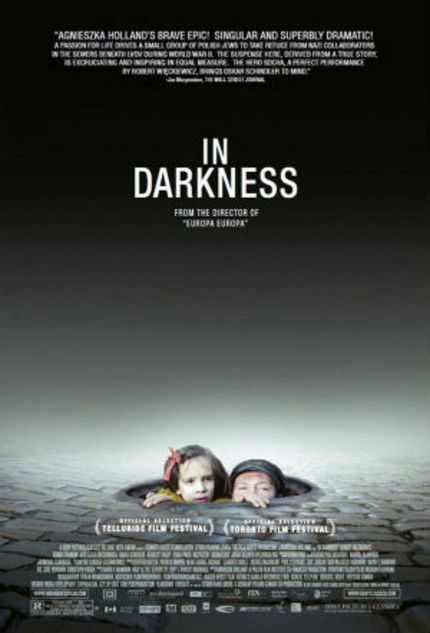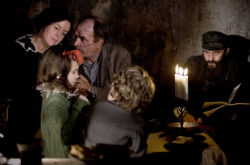Review: IN DARKNESS Goes into Sewers for a Polish Holocaust Story

Who knew that raw sewage was such a strong aphrodisiac?
Poland's submission for Best Foreign Language Film, In Darkness ended up with an Academy Award nomination this year, though the far superior A Separation won the Oscar. It's easy to understand why In Darkness received a nomination; not only is it difficult for the Academy to resist a Holocaust-themed drama in general, this particular one boasts a distinguished director in Agnieszka Holland (Europa Europa, Copying Beethoven) and a story that is not overly familiar.
The Jewish residents of Lvov, Poland, are in fear for their lives during World War II, threatened with extermination by the Nazi regime. But, as emphasized in the film, the terrorized men and women have the same physical needs that are common to all people. Before descending into the city's sewer system in order to escape certain detention and likely death, one couple fulfills their sexual desires under the disbelieving eye of the man's wife and daughter. Later, after a small group has taken refuge in a cramped chamber underground, a lonely woman is so aroused from watching a couple make love amidst the filth that she masturbates -- until she realizes someone else is watching her.
It's all rather sordid, though it contributes to the sense that Holland wanted to make a Holocaust story in which no one appears too noble. Indeed, she has succeeded to such a degree that the movie is a stifling, oppressive affair, filled with all-too-human characters whose imperfect actions speak much louder than their softly-uttered words.
The film is based on In the Sewers of Lvov: A Heroic Story of Survival from the Holocaust, written by Robert Marshall and published in 1991. (Krystyna Chiger wrote of her own experiences in the sewers in her book The Girl in the Green Sweater: A Life in Holocaust's Shadow, co-authored with Daniel Paisner and published in 2009.) David F. Shamoon's script moves the action quickly underground, where the narrative is marooned for the balance of the running time.
The story, literally, has nowhere to go from there.
 Leopold Socha (Robert Wieckiewicz), an opportunist sewer worker, is the protagonist. He's a none-too-religious Catholic, with a wife and child, and is accustomed to fending for himself, having been forced to live on the streets in his youth. When he discovers Jews seeking refuge in the sewers, he smells money, and bluntly offers his services in exchange for a healthy sum of money.
Leopold Socha (Robert Wieckiewicz), an opportunist sewer worker, is the protagonist. He's a none-too-religious Catholic, with a wife and child, and is accustomed to fending for himself, having been forced to live on the streets in his youth. When he discovers Jews seeking refuge in the sewers, he smells money, and bluntly offers his services in exchange for a healthy sum of money.
After the Jews are (more or less) safely stowed underground, it's Leopold who becomes their main conduit to the outside world. Periodically, dangers and trials arise; not everyone will survive.
Over the course of the story, we're meant to see Leopold undergo a crisis of conscience and then slowly change into an altruistic provider. Reportedly, that's what happened in real life, but in the film Leopold's transformation is too abrupt to be convincing, especially after a lifetime as a hard-bitten pragmatic.
Without that saving grace, we're left with enduring month after month of uncomfortable survival, distracted only by the on-screen relieving of sexual tensions. It's enough to send one scurrying to the shower -- or to the bookstore, to read the real-life accounts of evil and suffering, and contemplate the horrendous evil that men do.
In Darkness expands its limited U.S. theatrical run today, and will expand further across the country over the next month or so. Check the official site, linked below, for playdates and theater listings.







